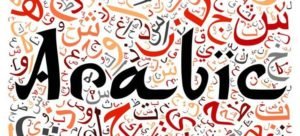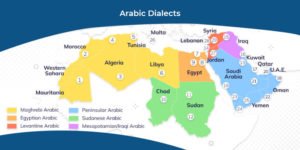Arabic Dialects: Navigating the Complexities of Regional Variation
The Arabic language is as diverse as the lands it spans, rich with history, culture, and, of course, a tapestry of dialects. As one of the most widely spoken languages globally, Arabic serves as a linguistic bridge between nations and peoples. Yet, within this linguistic mosaic, Arabic dialects emerge as fascinating and complex facets of this ancient language.

For businesses and organizations expanding into Arabic-speaking markets or individuals seeking to communicate effectively with Arabic speakers, understanding the nuances of Arabic dialects is essential. In this blog post, we will explore the intricacies of Arabic dialects, the reasons behind their regional variations, and the importance of navigating these complexities for successful communication.
The Spectrum of Arabic Dialects
Arabic dialects can be likened to branches of a vast linguistic tree, stemming from the Classical Arabic trunk. While Classical Arabic serves as the language of the Quran and formal writing, it is not the spoken language of daily life for most Arabic speakers. Instead, individuals across the Arabic-speaking world use their own dialects for everyday communication.

The sheer diversity of Arabic dialects can be attributed to historical, geographical, and sociopolitical factors. Each region, city, and even village may have its own unique dialect, characterized by variations in vocabulary, pronunciation, and grammar. Some of the most prominent Arabic dialects include Egyptian, Levantine (spoken in the Levant region), Gulf Arabic, Moroccan, and Algerian.
Historical Origins of Arabic Dialects
To understand the origins of Arabic dialects, we must delve into the history of the Arabic-speaking world. The spread of Islam in the 7th century played a significant role in unifying the Arabian Peninsula and parts of the surrounding regions under the umbrella of the Arabic language. However, as these regions embraced Islam and Arabic, they also infused the language with their own linguistic influences.

Consequently, Arabic dialects evolved over centuries, shaped by interactions with other languages and cultures. For example, the Egyptian dialect bears traces of Coptic, a remnant of Egypt’s ancient history, while the Maghrebi dialects have been influenced by Berber languages and French due to the colonial history of North Africa.
Geographic Factors
Geography plays a vital role in the formation of Arabic dialects. The vastness of the Arabic-speaking world, spanning from the Atlantic coast of Morocco to the Arabian Gulf, naturally led to geographic isolation. As a result, regions developed their unique dialects, reflecting the specific linguistic influences and historical interactions of their inhabitants.
Sociopolitical Factors
Sociopolitical factors have also contributed to the divergence of Arabic dialects. Colonialism, trade, and migrations have led to the mixing of dialects and the incorporation of foreign words. Additionally, regional identities have played a role in the preservation and differentiation of dialects, as people take pride in their unique linguistic heritage.
The Importance of Navigating Arabic Dialects
- Effective Communication: Understanding Arabic dialects is crucial for effective communication. Using a dialect that resonates with your target audience can facilitate rapport and trust.
- Marketing and Localization: Businesses expanding into Arabic-speaking markets must tailor their marketing materials and products to specific regions. A one-size-fits-all approach is unlikely to succeed in a diverse linguistic landscape.
- Cultural Sensitivity: Navigating dialects demonstrates cultural sensitivity and respect for local traditions. It can help businesses avoid misunderstandings and potential cultural missteps.
- Building Relationships: Building relationships and partnerships in Arabic-speaking regions often requires speaking the local dialect. It fosters connections and collaboration, whether in business or diplomacy.
- Media and Entertainment: Arabic dialects are prevalent in media and entertainment. Understanding dialects enhances appreciation of Arab cinema, music, and literature, which are often expressed in regional dialects.
Overcoming Challenges
Navigating Arabic dialects can be challenging, but it is essential for successful cross-cultural communication. To overcome these challenges:
- Consult Experts: Seek guidance from professional translators and linguists who specialize in Arabic dialects.
- Customize Content: Tailor your content and messaging to the specific dialect of your target audience.
- Language Training: Invest in language training for employees who will be interacting with Arabic speakers.
- Stay Informed: Keep abreast of linguistic and cultural developments in your target regions.
In conclusion, Arabic dialects are a testament to the linguistic diversity and cultural richness of the Arab world. Navigating the complexities of these dialects is not just a linguistic challenge but a key to unlocking opportunities in the diverse and dynamic Arabic-speaking markets. At SpeakThyLanguage, we understand the significance of Arabic dialects and are committed to providing accurate and culturally sensitive translation and localization services to help our clients bridge the language gap and succeed in their endeavors across the Arabic-speaking world.
Speakthylanguage is a language service provider working for more than 2 decades & offers professional translation services in 80 languages. Whether you need to translate a document, website, or video, Speakthylanguage has the expertise and resources to help you communicate effectively with your global audience.
In addition to translation services, Speakthylanguage also specializes in creating and managing multilingual websites. By translating your website content into multiple languages, you can reach customers from all over the world and provide them with a seamless online experience.
At Speakthylanguage, we are committed to delivering high-quality translations that are accurate, culturally appropriate, and tailored to your specific needs. Contact us today to learn more about our services and how we can assist you with your language needs.
Email us at: info@speakthylanguage.com




